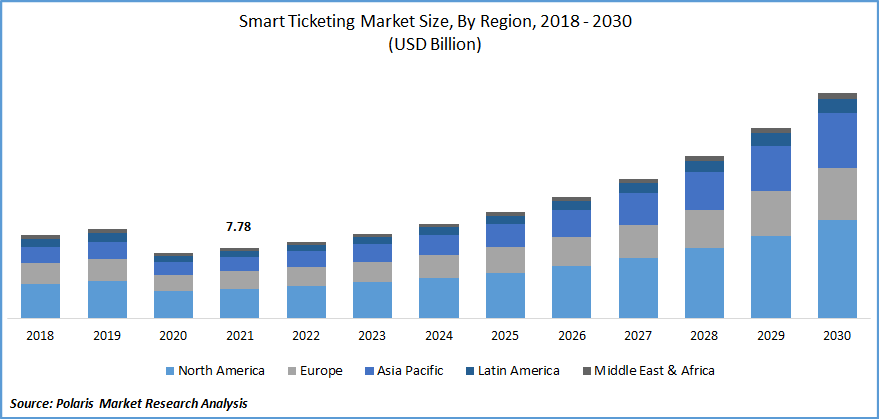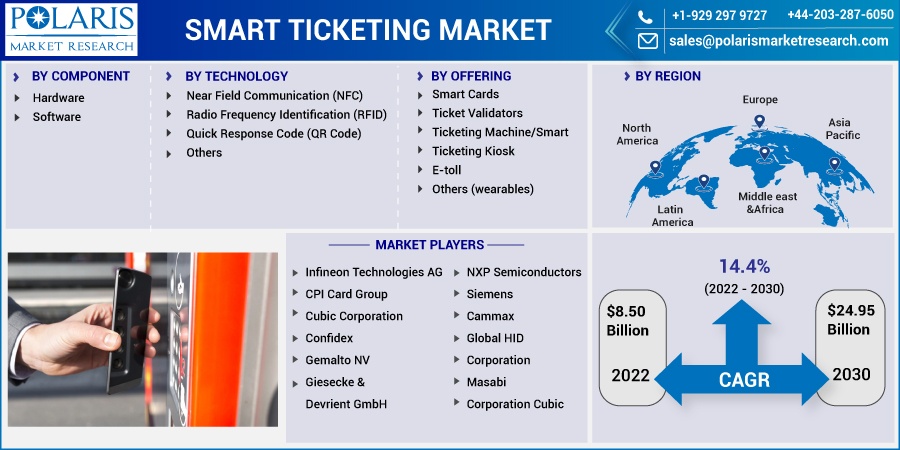
Smart Ticketing Market Share, Size, Trends, Industry Analysis Report
By Component (Hardware, Software); By Technology (NFC, RFID, QR Code, Others); By Offering; By Region; Segment Forecast, 2022 - 2030
- Published Date:Oct-2022
- Pages: 119
- Format: PDF
- Report ID: PM2677
- Base Year: 2021
- Historical Data: 2018-2020
Report Outlook
The global smart ticketing market was valued at USD 7.78 billion in 2021 and is expected to grow at a CAGR of 14.4% during the forecast period. Implementing smart ticketing systems by several public transportation providers worldwide is likely to drive market growth during the forecast period. In contrast to printed or paper-based tickets, these options are effective and affordable. The market expansion is also anticipated to be fueled by increased cashless transactions worldwide.

Know more about this report: Request for sample pages
The parking and transportation industries, as well as the sports and entertainment industries, all heavily rely on electronic ticketing. It delivers a better travel experience, the best fare price for each journey, reduces environmental effects, and saves time. These tickets are difficult to duplicate, and the ticket linked to the smart card can be canceled in the event that it is stolen or lost.
The use of smart tickets also saves time because a customer does not have to wait in extensive lines to buy tickets. Additionally, various governments worldwide are promoting cashless transactions, which is anticipated to generate a lucrative opportunity for the market. For instance, a study by the World Tourism Organization found that tourism rose by 4% globally in 2021. Moreover, 420 million people travelled the world in 2021, up from 400 million in 2020. The growth of the travel and tourist industry will favor the smart ticketing market.
The COVID-19 epidemic has had a significant impact on APAC transport connections. Governmental organizations have faced enormous challenges due to it, including new uncertainties and difficult trade-offs. In March 2020, the number of nations implementing travel restrictions more than doubled, significantly reducing the number of passengers seeking transportation.
To overcome these challenges, governments have initiated several programs to limit the pandemic's spread. Smart ticketing protects drivers and passengers from harmful diseases by doing away with the necessity for currency payments.
This solution integrates back-office operations and analytics technologies with mobile apps, online services, and card readers to provide detailed information to local governments and transportation companies. Data analytics increases profitability and optimizes smart transportation schemes by giving access to trip statistics and facilitating the simple management of transactional data to ensure accurate travel reimbursements. The handling of transit data is made more accessible by centralized software that enables operators and authorities to connect with data from various nodes.
 Know more about this report: Request for sample pages
Know more about this report: Request for sample pages
Industry Dynamics
Growth Drivers
Growing digitization and enhanced connectivity are driving the digital transformation of transportation networks. Urban regions worldwide are transitioning to serve customers better, increase operational effectiveness, and provide greater services. Because of their quickness, security, and user-friendliness, electronic ticketing systems are becoming increasingly popular in public transportation networks, sports, and entertainment sectors.
The ticketing system provides a practical and economical way to plan a route for public transportation users. It offers various amenities to travelers, including durability and portability in a small package. Additionally, it permits users to load credit amounts into their tickets before their trip. As a result, the adoption of mobile ticketing systems is anticipated to be a key area of attention for public transit networks and the sports industries, propelling the smart ticketing market's growth at a rapid rate throughout the projected period.
Report Segmentation
The market is primarily segmented based on component, technology, offering, application, and region.
|
By Component |
By Technology |
By Offering |
By Region |
|
|
|
|
Know more about this report: Request for sample pages
Software segment is predicted to grow at the fastest rate
During the forecast period, the software category is likely to grow significantly. Smart card software often manages the lifespan and use of smart cards or other innovative media. Additionally, by improving communication between clients and customer support professionals, this software enables more efficient client problem handling.
Furthermore, hardware categories are widely used at athletic and entertainment events and at parking lots, toll booths, and other locations to provide virtual tickets that may be securely stored on smart cards and mobile devices. The usability, variety of designs, and integration of contactless and touch credit card devices into these devices significantly impact the market growth anticipated for the time period under consideration.
In terms of growth, the service segment is predicted to expand the fastest. Over the forecast period, it is anticipated that a rise in digital ticketing services will help travelers have more comfortable travel experiences. Passengers can quickly move between multi-modal transportation systems thanks to ticketing as a service, which determines the correct fare.
Near-field communication technology is expected to grow during the forecast period
The segment of near-field communication is anticipated to increase at the fastest rate during the forecast period. The broad application of NFC technology also makes it possible to buy tickets quickly by waving a payment method or moving a contactless smart card close to smart card readers. Mobile phones with NFC capabilities are widely used to access digital data, carry out secure contactless transactions, and save tickets for usage at gates and parking lots.
A non-contact, wireless technology called RFID also increases users' ability to make purchases outside a 100-meter range without entering a password. This technology makes use of electromagnetic waves to detect and track tags. For example, in April 2021, Calypso Networks Association and NFC Forum worked together to develop cutting-edge, secure mobile ticketing solutions.
Smart cards sector is expected to hold the significant revenue share
Smart cards hold the largest market share. Smart cards are being used more frequently by passengers in big cities and small villages because they provide them with the option to pay with a contact or contactless card and give them the best deals on tickets and e-tolls for each trip.
In addition, smart cards are small in size and have a memory chip or microprocessor that can be used for several tasks when combined with a smart card reader. In this approach, smart cards could be applied in various ways that are crucial for fostering market expansion. It is estimated that the segment for intelligent parking systems will grow at the fastest rate during the projected time frame.
More advancements have been achieved in intelligent parking technologies. Increasing innovative parking technology improvements have enabled drivers to pay for parking using smart cards. Additionally, the need for better intelligent parking solutions is being driven by increasing traffic congestion.
Europe market is predicted to grow significantly over the forecast period
Europe smart ticketing market dominated the overall revenue in 2021. European governments place a high priority on the digitization of public transportation and the adoption of sustainable transportation laws. The growth of the European market can also be attributed to the existence of significant market participants, such as Giesecke & Devrient and Infineon Technologies AG.
As a result of technological advancements, ticketing solution providers have begun to use technologies like QR codes, barcode scanners, and NFC, which has ultimately increased the popularity of these ticketing options. For instance, in 2019, Vix Technology announced the debut of Vix Whisper, a new contactless EMV payment service, in conjunction with the Greater Manchester Metro link network's acceptance of contactless payments.
Competitive Insight
Some of the major players operating in the global smart ticketing market include Infineon Technologies AG, CPI Card Group, Cubic Corporation, Confidex, Gemalto NV, Giesecke & Devrient GmbH, NXP Semiconductors, Siemens, Cammax, Global HID Corporation, Masabi, and Corporation Cubic.
The leading players in the market collaborate to deliver cutting-edge electronic ticketing solutions for transportation, sports, and multimedia technologies in order to continue the ticketing and travel process more successfully. To successfully satisfy the escalating expectations of clients, providers are also collaborating and developing alliances with other market players.
Recent Developments
- Infineon Technologies introduced the SLC36/SLC37 security controller systems in February 2021, including high-performance 32-bit ARM SecurCore dual interface processors.
- A deal to convert the fare payment system for Metro-North Railroad and Long Island Rail Road to a new account-based contactless fare payment system was signed by Cubic's CTS business division and the New York Metropolitan Transportation Authority, in February 2021.
Smart Ticketing Market Report Scope
|
Report Attributes |
Details |
|
Market size value in 2022 |
USD 8.50 billion |
|
Revenue forecast in 2030 |
USD 24.95 billion |
|
CAGR |
14.4% from 2022 - 2030 |
|
Base year |
2021 |
|
Historical data |
2018 - 2020 |
|
Forecast period |
2022 - 2030 |
|
Quantitative units |
Revenue in USD billion and CAGR from 2022 to 2030 |
|
Segments covered |
By Component, By Technology; By Offering, By Application, By Region |
|
Regional scope |
North America, Europe, Asia Pacific, Latin America; Middle East & Africa |
|
Key companies |
Infineon Technologies AG, CPI Card Group, Cubic Corporation, Confidex, Gemalto NV, Giesecke & Devrient GmbH, NXP Semiconductors, Siemens, Cammax, Global HID Corporation, Masabi, and Corporation Cubic |
